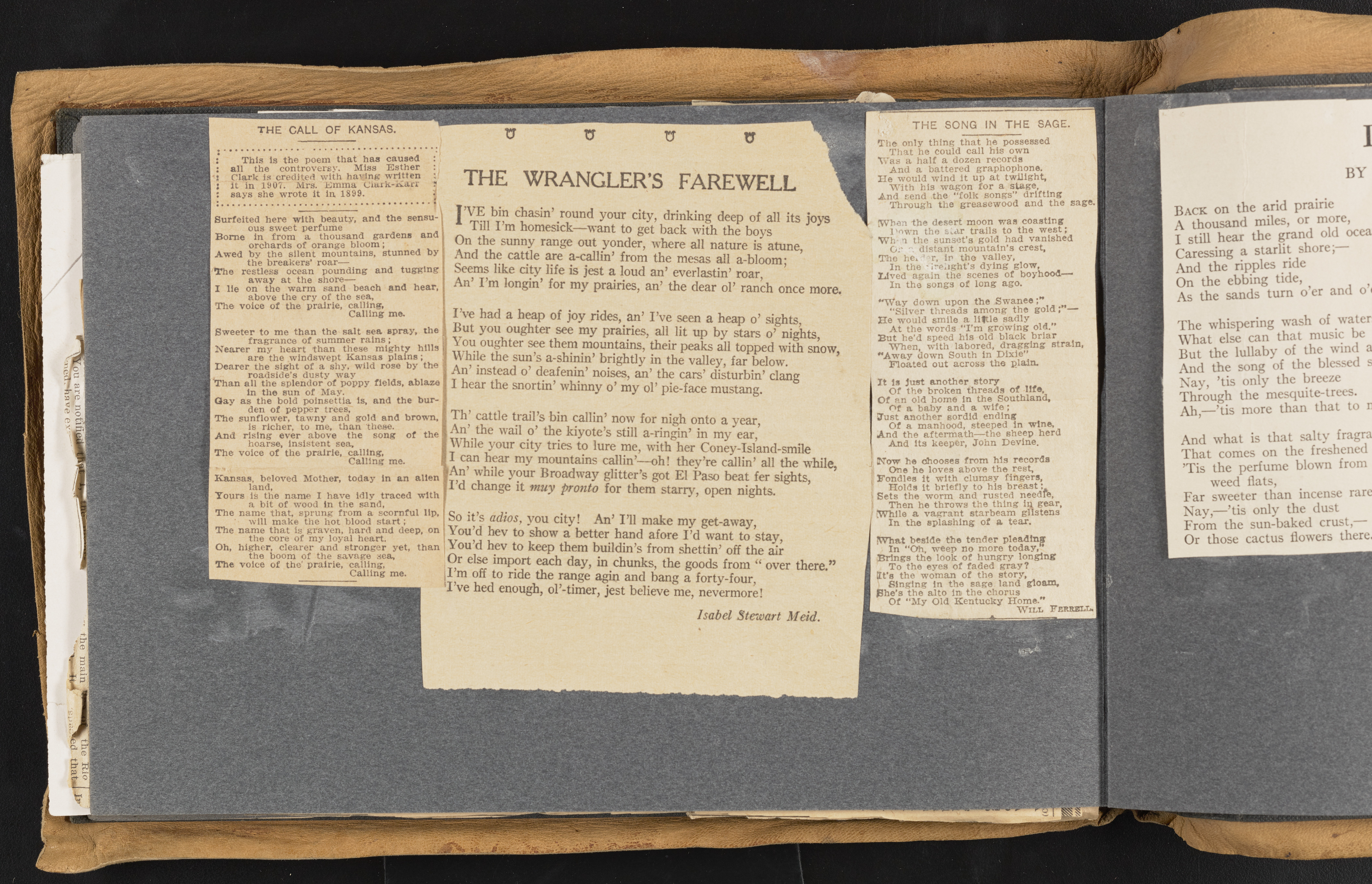Copyright & Fair-use Agreement
UNLV Special Collections provides copies of materials to facilitate private study, scholarship, or research. Material not in the public domain may be used according to fair use of copyrighted materials as defined by copyright law. Please cite us.
Please note that UNLV may not own the copyright to these materials and cannot provide permission to publish or distribute materials when UNLV is not the copyright holder. The user is solely responsible for determining the copyright status of materials and obtaining permission to use material from the copyright holder and for determining whether any permissions relating to any other rights are necessary for the intended use, and for obtaining all required permissions beyond that allowed by fair use.
Read more about our reproduction and use policy.
I agree.Information
Digital ID
Permalink
Details
Member of
More Info
Rights
Digital Provenance
Publisher
Transcription
TH E CALL OF KANSAS THE SONG IN THE SAGE The only thing that he possessed That he could call his own W as a half a dozen records And a battered graphophone. H e would wind it up at twilight, W ith his wagon for a stage, And send the “ folk songs” drifting Through the greasewood and the sage. [When the desert moon was coasting 1 'own the sUir trails to the w est; Wh- a the sunset’s gold had vanished Or r. distant mountain’s crest, The he* * r, in the valley, In the ' Ireiight’s dying glow, U v ed again the scenes of boyhood— In the songs o f long ago. ?W ay down upon the Swanee ;** “ Silver threads am ong the g o ld ; — He would smile a liftle sadly A t the words “ I'm grow ing old. * But he'd speed his old black briar W hen, with labored, dragging strain, **Away down South in D ixie” Floated out across the plain. It is just another story O f the broken threads of life, O f an old home in the Southland, Of a baby and a w ife ; STust another sordid ending Of a manhood, steeped In wine. And the aftermath— the sheep herd And its keeper, John Devine. N ow he dhooses from his records One he loves above the rest. Fondles it with clumsy fingers, Holds it briefly to his b rea st; Sets the worm and rusted needle, Then he throws the thing in gear, W hile a vagrant starbeam glistens In the splashing o f a tear. W hat beside the tender pleading In “ Oh, weep no more today. Brings the look o f hungry longing To the eyes o f faded gray? (It’s the woman o f the story, Singing in the sage land gloam, JShe’s the alto in the chorus Of “ M y Old Kentucky Home.** ___ W i l l F e r r e l l . This is the poem that has caused all the controversy. Miss Esther Clark is credited with having written It in 1907. Mrs. Emma Ci&rk-Karr says she wrote it in 1899. THE WRANGLER’S FAREWELL B a c k on the arid pram e A thousand m iles, or m ore, I still hear the grand old ocea Caressing a starlit shore, A n d the ripples ride O n the ebbing tide, , A s the sands turn o er and o 1 T h e whispering w ash of water w >.at pke can that music be I V / c? asm round your city, drinking deep of all its joys Till I m homesick— want to get back with the boys On the sunny range out yonder, where all nature is atune, And the cattle are a-callin' from the mesas all a-bloom ? Seems like city life is jest a loud an’ everlastin’ roar, A n ’ I ’m longin’ for m y prairies, an’ the dear ol’ ranch once more I ’ve had a heap of jo y rides, an’ I ’ve seen a heap o ’ sights But you oughter see m y prairies, all lit up by stars o ’ nights Y ou oughter see them mountains, their peaks all topped with snow W hile the sun s a-shinin’ brightly in the valley, far below. Surfeited here with beauty, and the sensuous sweet perfume Borne in from a thousand gardens and orchards o f orange b loom ; Awed by the silent mountains, stunned by the breakers’ roar— /T he restless ocean pounding and tugging aw ay at the shore— I lie on the warm sand beach and hear, above the cry of the sea, The voice of the prairie, calling, Calling me. Sweeter to me than the salt sea spray, the fragrance of summer ra in s; Nearer my heart than these mighty hills are the windswept Kansas plain s; Dearer the sight of a shy, wild rose by the roadside’s dusty way Than all the splendor of poppy fields, ablaze in the sun o f May. Gay as the bold poinsettia is, and the burden o f pepper trees, The sunflower, tawny and gold and brown, is richer, to me, than these. And rising ever above the song o f the hoarse, insistent sea. The voice of the prairie, calling, Calling me. Kansas, beloved Mother, today in an alien land, Tours is the name I have idly traced with a bit of wood in the sand, The name that, sprung from a scornful lip, will make the hot blood start; The name that is graven, hard and deep, on the core of my loyal heart. Oh, higher, clearer and stronger yet, than the boom of the savage sea, The voice of the' prairie, calling, Calling me.

